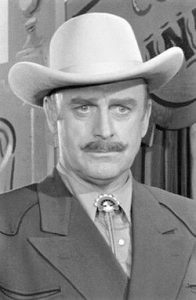
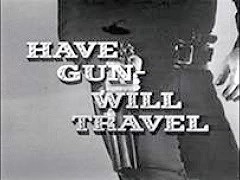 Have Gun–Will Travel (1958-60) aired “A Matter of Ethics”” on February 1, 1959 as the show’s 11th episode out of what would be a total of 106 over its two year run. This is only the fifth episode we have shared of this much loved western, the first being in September of 2019, the second and third coming in March and October of 2020, and the fourth earlier this year in April of 2021. A recap of the backstory of the program is in order for newcomers.
Have Gun–Will Travel (1958-60) aired “A Matter of Ethics”” on February 1, 1959 as the show’s 11th episode out of what would be a total of 106 over its two year run. This is only the fifth episode we have shared of this much loved western, the first being in September of 2019, the second and third coming in March and October of 2020, and the fourth earlier this year in April of 2021. A recap of the backstory of the program is in order for newcomers.
The very existence of the radio show is an odd duck, in that while not unique it was one of the very rare radio shows to be a spinoff of a successful tv show, which is backwards from the usual sequence of events, with the radio show coming first, then the tv show (for examples of the usual order, see Gunsmoke, Dragnet, and The Lone Ranger). In this case, Have Gun–Will Travel on television first aired in 1957 and its radio counterpart aired its first episode just over a year later in 1958. The original CBS tv series would run from September 1957 through April of 1963 and proved quite popular. Richard Boone (1917-1981) starred as Paladin, a cultured, educated, gun-for-hire living in San Francisco’s swanky Carlton Hotel during the period following the Civil War to approximately 1875 as a well-appointed man of wealth and sophistication, who earned his living by putting ads in local newspapers as a high-priced gunslinger with the simple calling card of “Have Gun–Will Travel.” While expensive to hire ($1,000 per day plus expenses) and ready, willing, and able to use his trademark gun when necessary, he often was a master at settling disputes or resolving issues in a diplomatic and bloodless manner.
 The term “paladin” itself has several meanings, among them “champion of the realm” or “trusted military leader” or even “a knight without armor in a savage land.” You get the idea. Paladin’s trademark is the iconic chess character of the knight, which he showcases on his signature black holster and on his business card. As backup to his handgun, Paladin also carried a double-barreled derringer behind his belt.
The term “paladin” itself has several meanings, among them “champion of the realm” or “trusted military leader” or even “a knight without armor in a savage land.” You get the idea. Paladin’s trademark is the iconic chess character of the knight, which he showcases on his signature black holster and on his business card. As backup to his handgun, Paladin also carried a double-barreled derringer behind his belt.
Famed radio director of such shows as Suspense, Escape, and later the popular tv westerns such as The Virginian and Gunsmoke, Norman Macdonnell championed the idea of spinning off a successful tv show to radio, and Have Gun–Will Travel on radio was born. One of my favorite radio and tv actors, John Dehner (1915-1992), was cast as radio’s Paladin, his resonating baritone perfect for the role. Dehner himself was in many ways like the character he played, for his father traveled a lot and Dehner went to school and was educated mostly in Europe (though he was born in New York). Along the way, he learned to speak four languages fluently and others to a lesser degree (including Norwegian, French, Spanish, Italian, Swedish, and even some Hopi Indian). In the early 1940s Dehner worked for Walt Disney Studios as an animator and did work for such iconic animated features as Fantasia (1940), Bambi (1942) and some Pluto, Donald Duck, and Mickey Mouse cartoons. After a stint in the Army during World War II he held jobs as a radio news editor and disc jockey, then graduated to numerous acting roles of various sizes, including, but not limited to shows such as The Hermit’s Cave (as host), and supporting roles in The Whistler, Gunsmoke, Suspense, Escape, Philip Marlowe, Frontier Gentleman (star), and the week following the demise of Frontier Gentleman, the star of Have Gun–Will Travel.
John Dehner’s television and film roles are far too many to list here, but he appeared in 125 feature films and shorts, and in well over another 100 tv roles from mystery to western to science fiction and is easily recognizable for his blue eyes, moustache, and again his iconc baritone that Radio Life Magazine said was the industry’s “best radio voice.” Of interest to SF fans, Dehner appeared three times on the original The Twilight Zone: in the first season as Captain Allenby in “The Lonely,” as engineer Alan Richards in “The Jungle” in its third season, and in its fifth and final season as Jared Garrity in “Mr. Garrity and the Graves.”
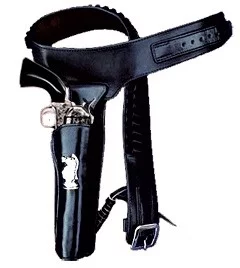 Of interest is that Norm Macdonnell was not only the champion of spinning off a radio program from its parent television show, but his idea to rewrite as closely as possible for radio the original tv scripts, thus, the initial 30 episodes of Have Gun were lifted from the already aired tv shows. [After that, Macdonnell would leave the show and go on to direct and write for television’s Gunsmoke, tv’s longest running (to that time, 1955-75) continuous prime time show in history.]
Of interest is that Norm Macdonnell was not only the champion of spinning off a radio program from its parent television show, but his idea to rewrite as closely as possible for radio the original tv scripts, thus, the initial 30 episodes of Have Gun were lifted from the already aired tv shows. [After that, Macdonnell would leave the show and go on to direct and write for television’s Gunsmoke, tv’s longest running (to that time, 1955-75) continuous prime time show in history.]
Last but not least, from an article in AVClub from 2014 by Brandon Nowalk titled “The Adult Western Peaked with Have Gun–Will Travel”: “…the adult Western, nominal or otherwise, is what TV audiences were looking for in the late ’50s. Have Gun – Will Travel wasn’t the first, it wasn’t the most popular, and it didn’t last the longest. But it was the best. Have Gun picked up the pieces of the adult Western and assembled them into something greater. There was Gunsmoke’s dramatic power, Earp’s pretension, and Cheyenne’s rootless energy. And where those others lost cast members, dipped in quality, or completely transformed, Have Gun stayed steady, a strong half-hour black-and-white adventure leading into Gunsmoke every Saturday night for six years.” Though it is true that Have Gun wasn’t the most popular show of its time, Nielsen ratings confirm that it ranked near the very top of the heap with a #3 or #4 rating for its first four years. (Gunsmoke would take top honors as the #1 show for four years, from 1958-61.)
“A Matter of Ethics” is a timeless story, revealing that the phenomenon of mob mentality is a dark amorphous creature lurking beneath the surface of mankind’s better nature, patiently waiting for the confluence of several factors to trigger its mindless, violent appearance. In this story Paladin is hired to make sure that the judicial process prevails and an accused man is treated fairly and not lynched before his trial. A problem muddies the waters, however, the nature of which forces Paladin to make a decision that boils down to “A Matter of Ethics.”
Play Time : 24:17
[Below: Paladin on radio, John Dehner, left — Paladin on tv, Richard Boone, right]
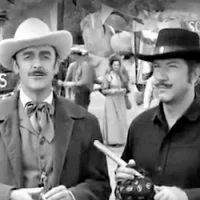
[Below: Paladin’s iconic business card]
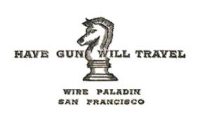
{“A Matter of Ethics” aired on a Sunday evening. The following Monday after school the neighborhood gang gathered at the corner newsstand to maybe find a pulp magazine devoted to the western genre along with one or more issues of their favorite SF magazines. If, Science Fiction (1952-74) had become one of the gang’s regular selections for a few years now. It was founded as a sister magazine to the Horace Gold edited Galaxy magazine, and though Gold would also edit If for a short while, he soon turned over the editorial reigns to Frederik Pohl who, years later, would earn If three straight Hugo awards for Best Professional Magazine from 1966-68. From 1956-63 it was a bi-monthly, with a blip in 1959 when it would publish only 4 issues. When it came to finding a Western pulp magazine, pickings had become lean by early 1959, most western magazines having gone by the wayside. Lovers of the western story—at least in the magazine format—were left to settle with magazines featuring stories about the western, one such being the magazine attributed as being the very first pulp magazine in history, Argosy, which switched from its former newspaper format to a pulp in 1894. It went through several altered subtitles and content emphasis, with 1943-79 known as its “slick” era. Thus, we find the February 1959 issue pictured below featuring a story about Gunsmoke, the hot new action/drama TV series that captured the interest of one of the neighborhood gang. Argosy was a monthly in 1959. Not a western pulp, Adventure (1910-71) looked enough like one at first glance from the cover of the issue below, that it held hope that the adventures of the sort found in the old west might be found within its pages, and that hope was all it would take for one of the gang to take this issue home. Adventure was also a monthly in 1959. It is worth noting that Adventure was begun in response to the success of Argosy—which at one point was selling 500,000 copies an issue—and that rather than a shotgun approach to the fiction it ran, Adventure would solicit and purchase those stories with a strong element of “danger and thrills,” which obviously was a winner.}
[Left: If SF, Feb. 1959 – Center: Argosy, Feb. 1959 – Right: Adventure, Feb. 1959]
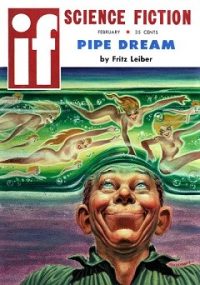
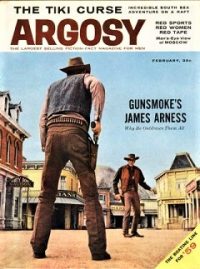
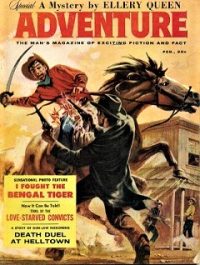
To view the entire list of weekly Old Time Radio episodes at Tangent Online, click here.